Scientific Image Gallery
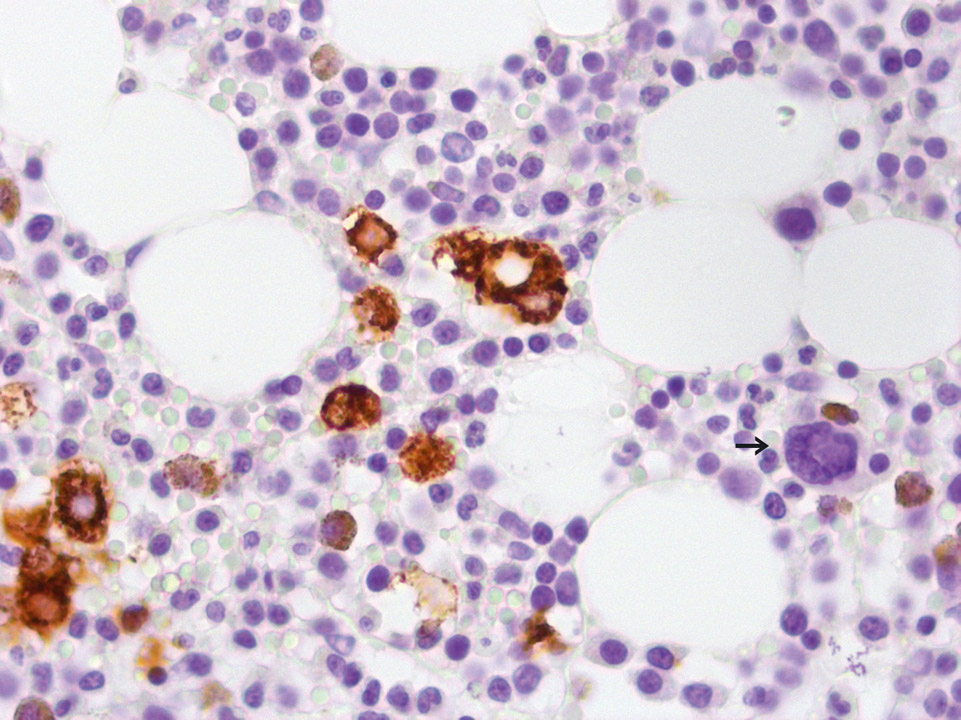
Bone marrow histology (immunohistochemistry with alkaline phosphatase reaction) of a patient with breast cancer: Carcinoma cells derive from epithelial cells that express cytokeratins in the cytoplasm. They were detected immunohistochemically with an antibody against cytokeratin 7 and visualised with a brownish stain. A megakaryocyte (->) has a size similar to the tumour cells, but is not labelled by this staining procedure.
<p>Bone marrow histology (immunohistochemistry with alkaline phosphatase reaction) of a patient with breast cancer: Carcinoma cells derive from epithelial cells that express cytokeratins in the cytoplasm. They were detected immunohistochemically with an antibody against cytokeratin 7 and visualised with a brownish stain. A megakaryocyte (->) has a size similar to the tumour cells, but is not labelled by this staining procedure.</p>
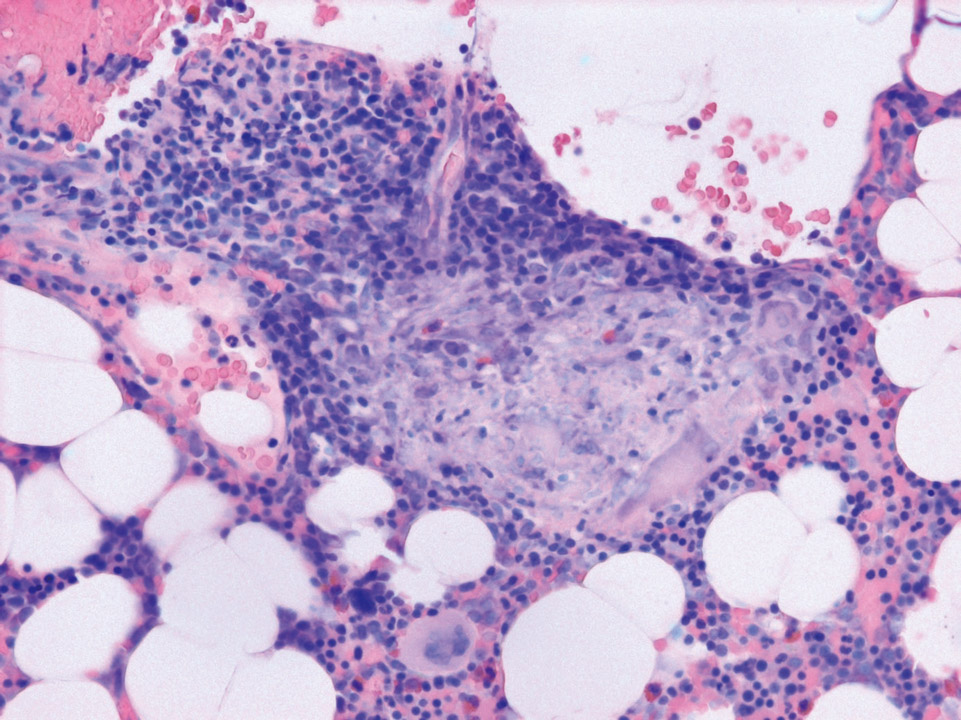
Bone marrow histology (Giemsa stain) of a patient with sarcoidosis. This is a systemic disease of the connective tissue with granuloma formation and of unknown cause. However, a mutation in the BTNL2 gene greatly increases the risk of developing sarcoidosis. The granuloma consists of so-called 'epitheloid' cells, which derive from macrophages, and Langhans giant cells (not to be confused with Langerhans cells).
<p>Bone marrow histology (Giemsa stain) of a patient with sarcoidosis. This is a systemic disease of the connective tissue with granuloma formation and of unknown cause. However, a mutation in the BTNL2 gene greatly increases the risk of developing sarcoidosis. The granuloma consists of so-called 'epitheloid' cells, which derive from macrophages, and Langhans giant cells (not to be confused with Langerhans cells).</p>
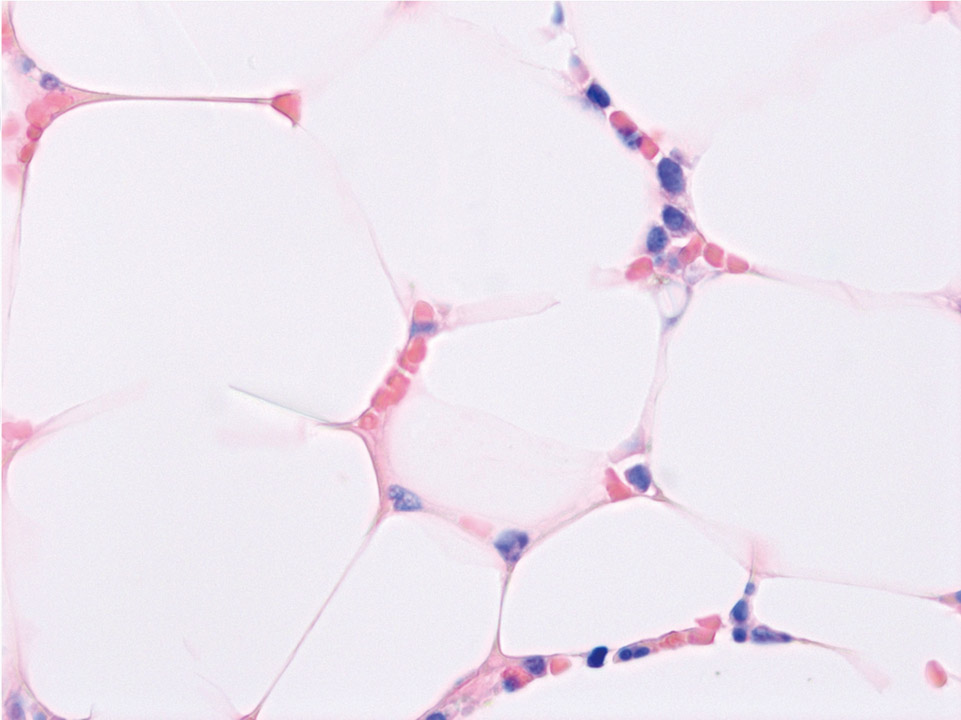
Bone marrow histology (Giemsa stain) of a patient with severe aplastic anaemia, showing an extremely reduced cell content: Almost only fat cells and a few erythropoietic precursor cells are visible.
<p>Bone marrow histology (Giemsa stain) of a patient with severe aplastic anaemia, showing an extremely reduced cell content: Almost only fat cells and a few erythropoietic precursor cells are visible.</p>
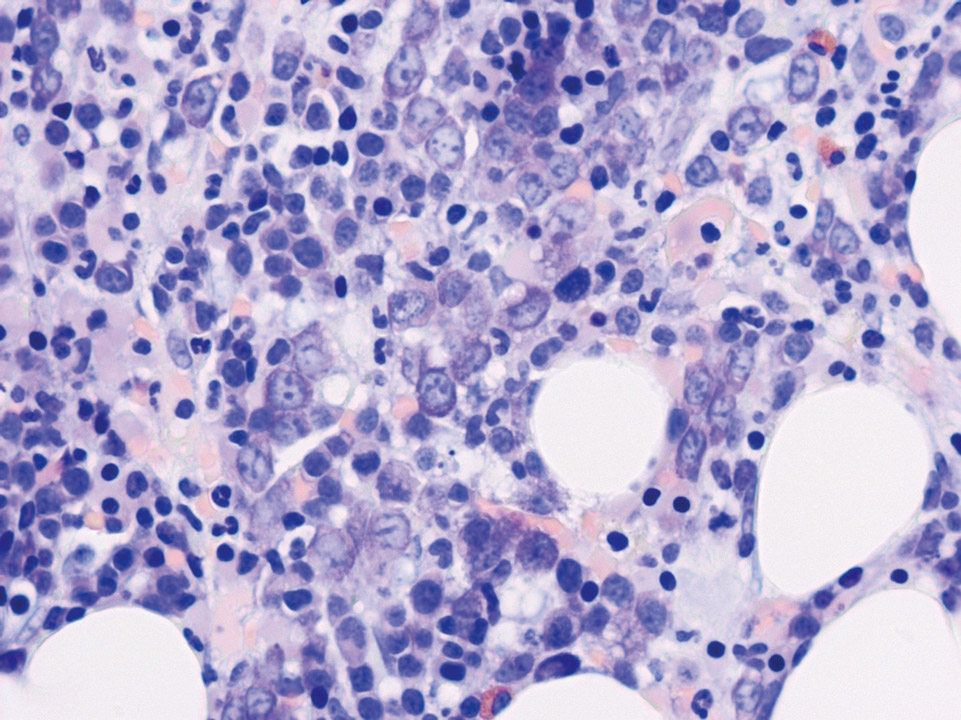
Bone marrow histology (Giemsa stain) of a patient showing altered bone marrow architecture and pronounced dysplasia (for example, the erythroblasts are too large and erythropoiesis cannot be clearly separated from granulopoiesis). The percentage of blast cells is between 10 and 20%. Diagnosis is RAEB-2. (Often the percentage of blast cells can be better determined in bone marrow cytology.)
<p>Bone marrow histology (Giemsa stain) of a patient showing altered bone marrow architecture and pronounced dysplasia (for example, the erythroblasts are too large and erythropoiesis cannot be clearly separated from granulopoiesis). The percentage of blast cells is between 10 and 20%. Diagnosis is RAEB-2. (Often the percentage of blast cells can be better determined in bone marrow cytology.)</p>
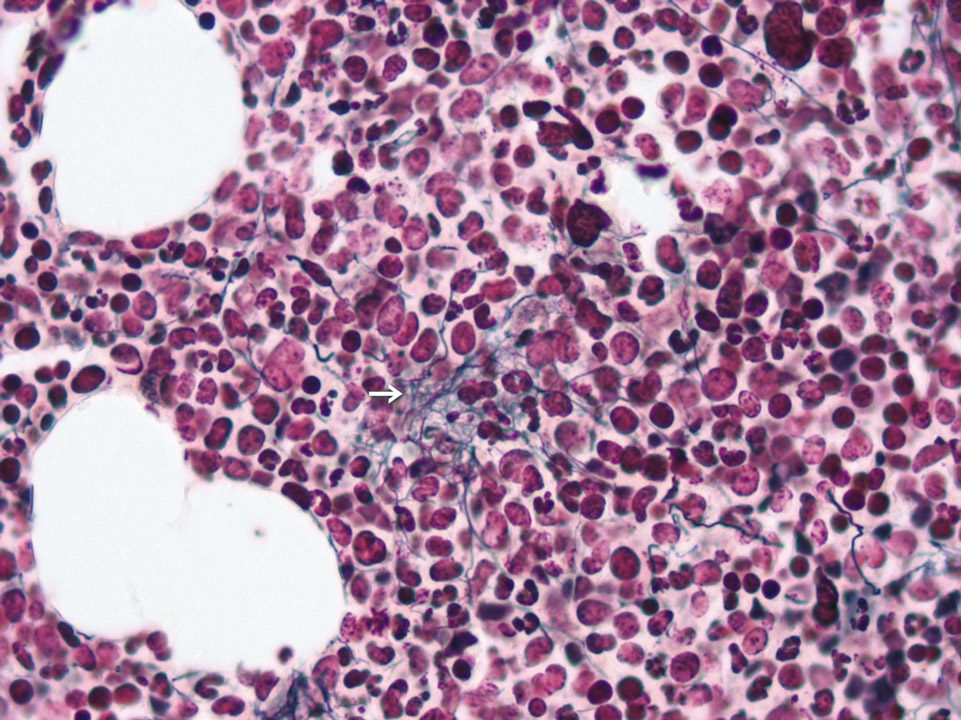
Bone marrow histology (Gomori stain) of a patient with AML showing blasts inducing an increased production of fibres (->), which are coloured black in this stain. Due to the high concentration of fibres the bone marrow could not be aspirated, making a bone marrow biopsy necessary.
<p>Bone marrow histology (Gomori stain) of a patient with AML showing blasts inducing an increased production of fibres (->), which are coloured black in this stain. Due to the high concentration of fibres the bone marrow could not be aspirated, making a bone marrow biopsy necessary. </p>
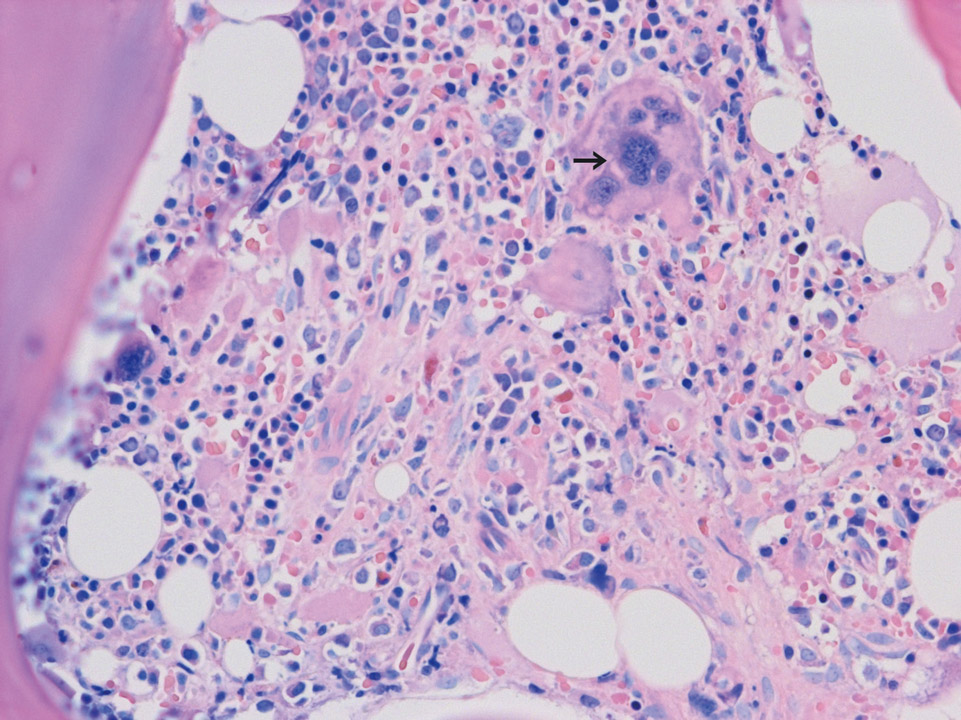
Bone marrow histology (Giemsa stain) showing the prefibrotic stage of PMF (also called CIMF). Capillaries and fibroblasts have a stringy appearance (lower part of the picture). In the upper third the haematopoietic tissue still looks normal. The highlighted megakaryocyte (->) is atypical.
<p>Bone marrow histology (Giemsa stain) showing the prefibrotic stage of PMF (also called CIMF). Capillaries and fibroblasts have a stringy appearance (lower part of the picture). In the upper third the haematopoietic tissue still looks normal. The highlighted megakaryocyte (->) is atypical. </p>
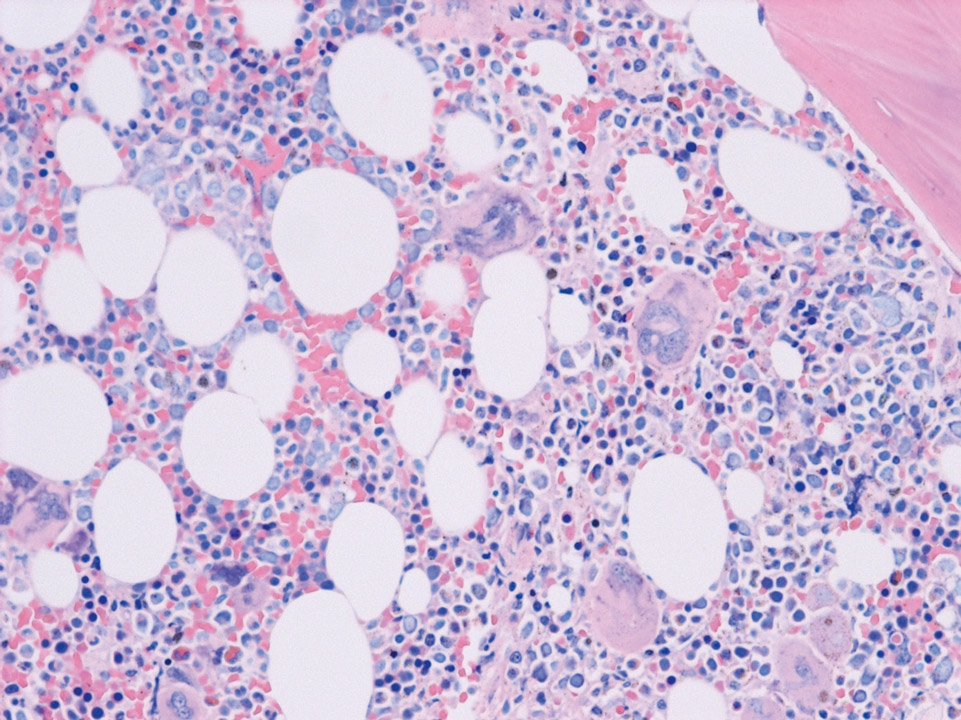
The bone marrow histology of this patient (Giemsa stain) shows significantly elevated ('hyperplastic') erythropoiesis and an increased number of megakaryocytes, which appear atypical. Diagnosis here is PV.
<p>The bone marrow histology of this patient (Giemsa stain) shows significantly elevated ('hyperplastic') erythropoiesis and an increased number of megakaryocytes, which appear atypical. Diagnosis here is PV.</p>
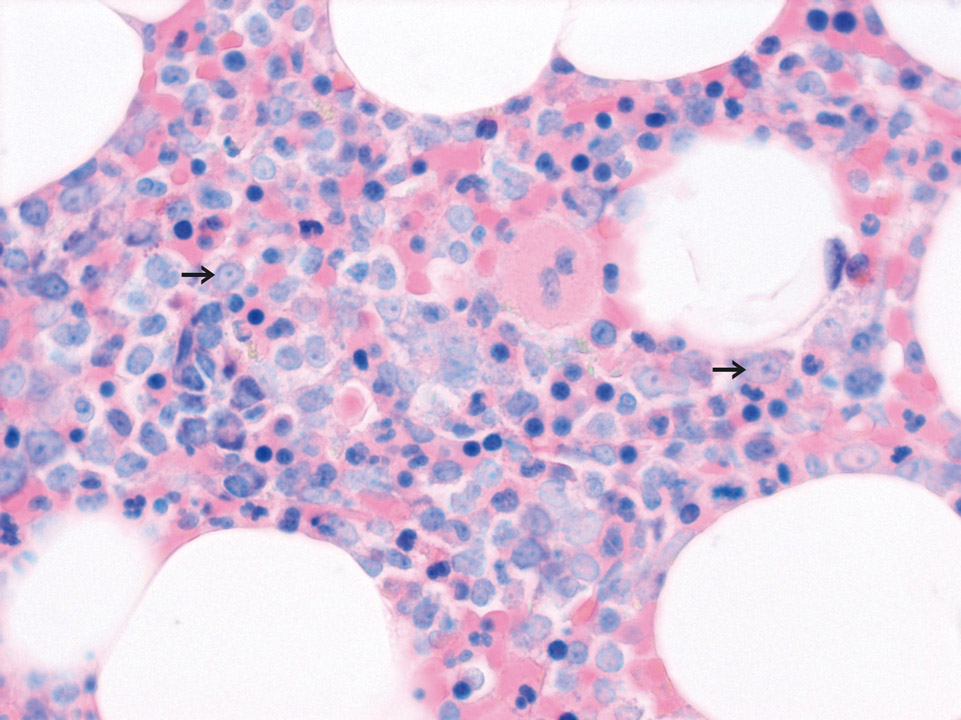
Bone marrow histology (Giemsa stain) with about 30% blast cells of a patient with AML. Two typical blasts are highlighted (->).
<p>Bone marrow histology (Giemsa stain) with about 30% blast cells of a patient with AML. Two typical blasts are highlighted (->).</p>
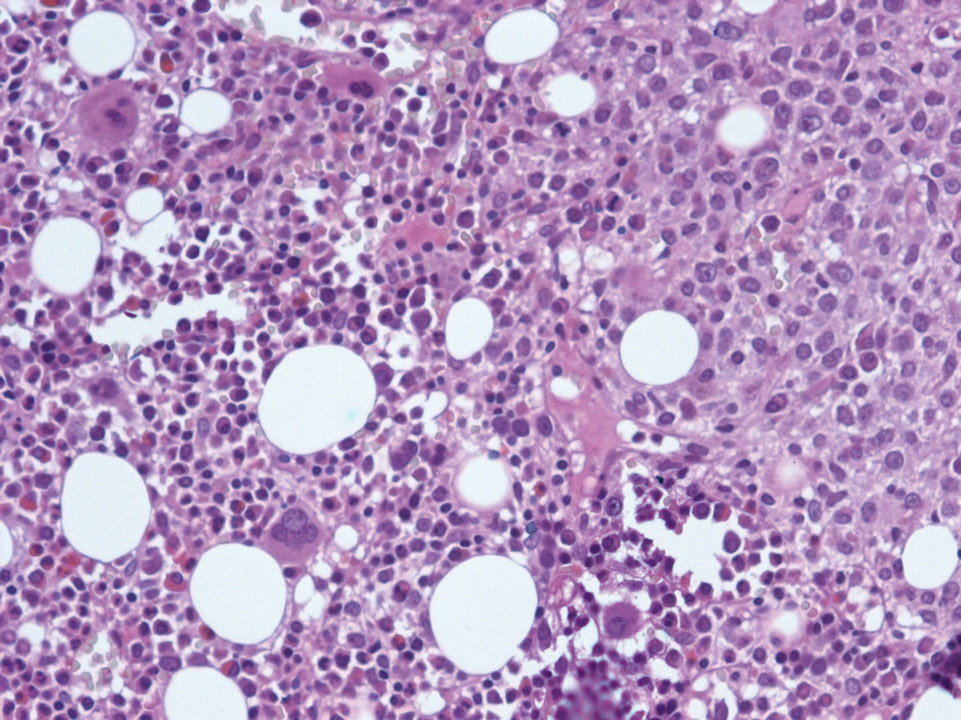
Bone marrow histology (haematoxylin eosin stain) with normal haematopoiesis on the left side. On the right side the bone marrow is infiltrated by a diffuse large B-cell lymphoma (DLBCL).
<p>Bone marrow histology (haematoxylin eosin stain) with normal haematopoiesis on the left side. On the right side the bone marrow is infiltrated by a diffuse large B-cell lymphoma (DLBCL).</p>


